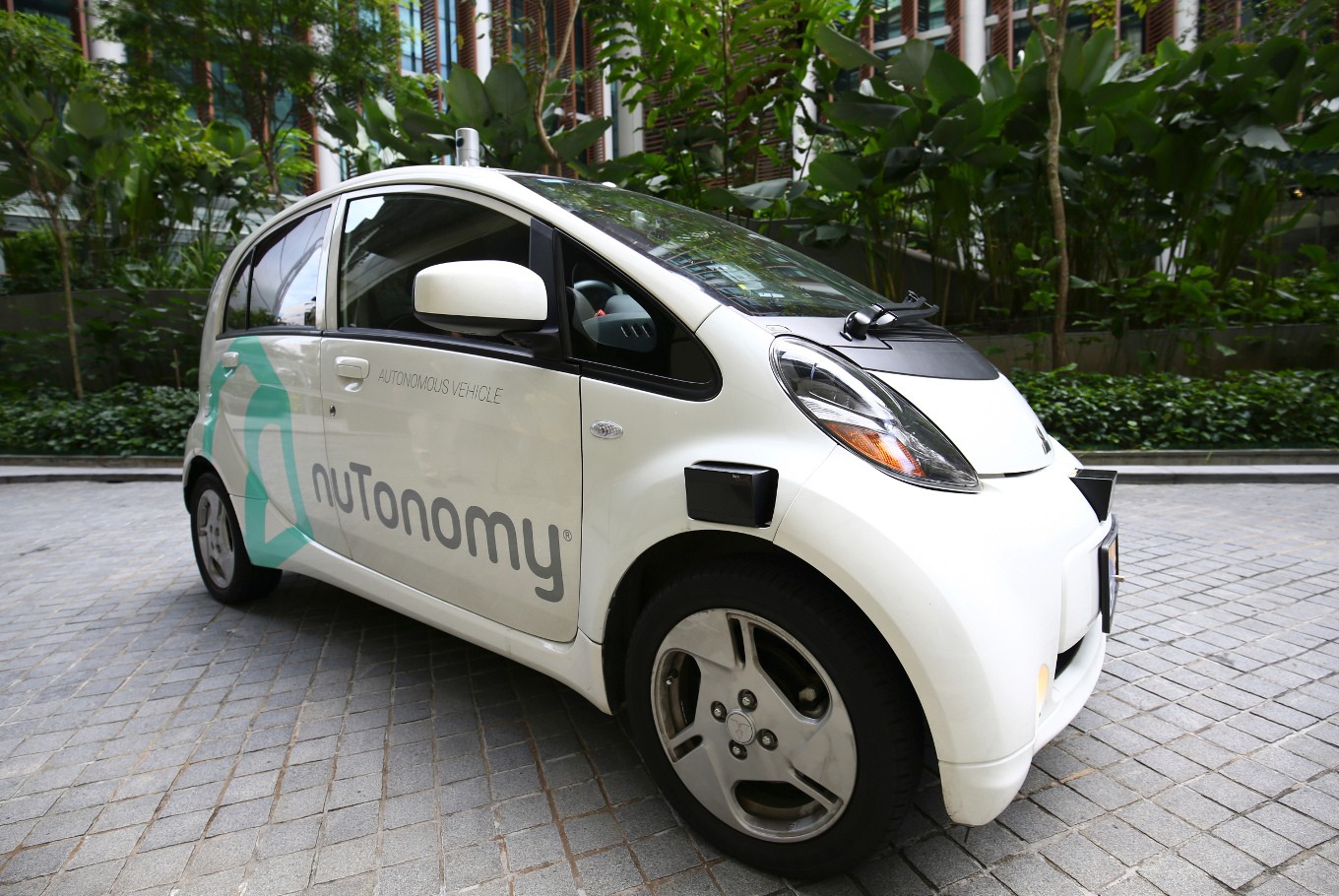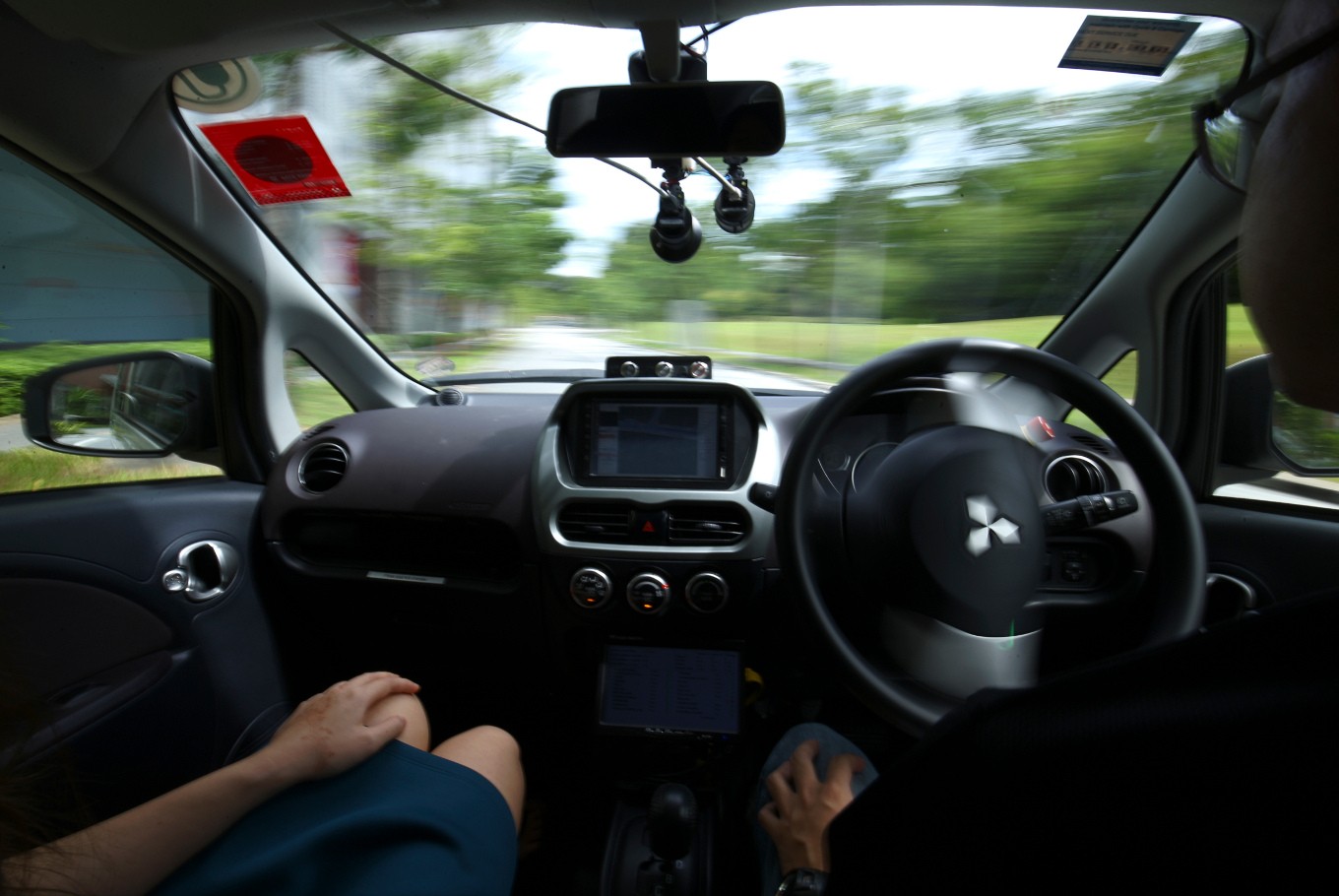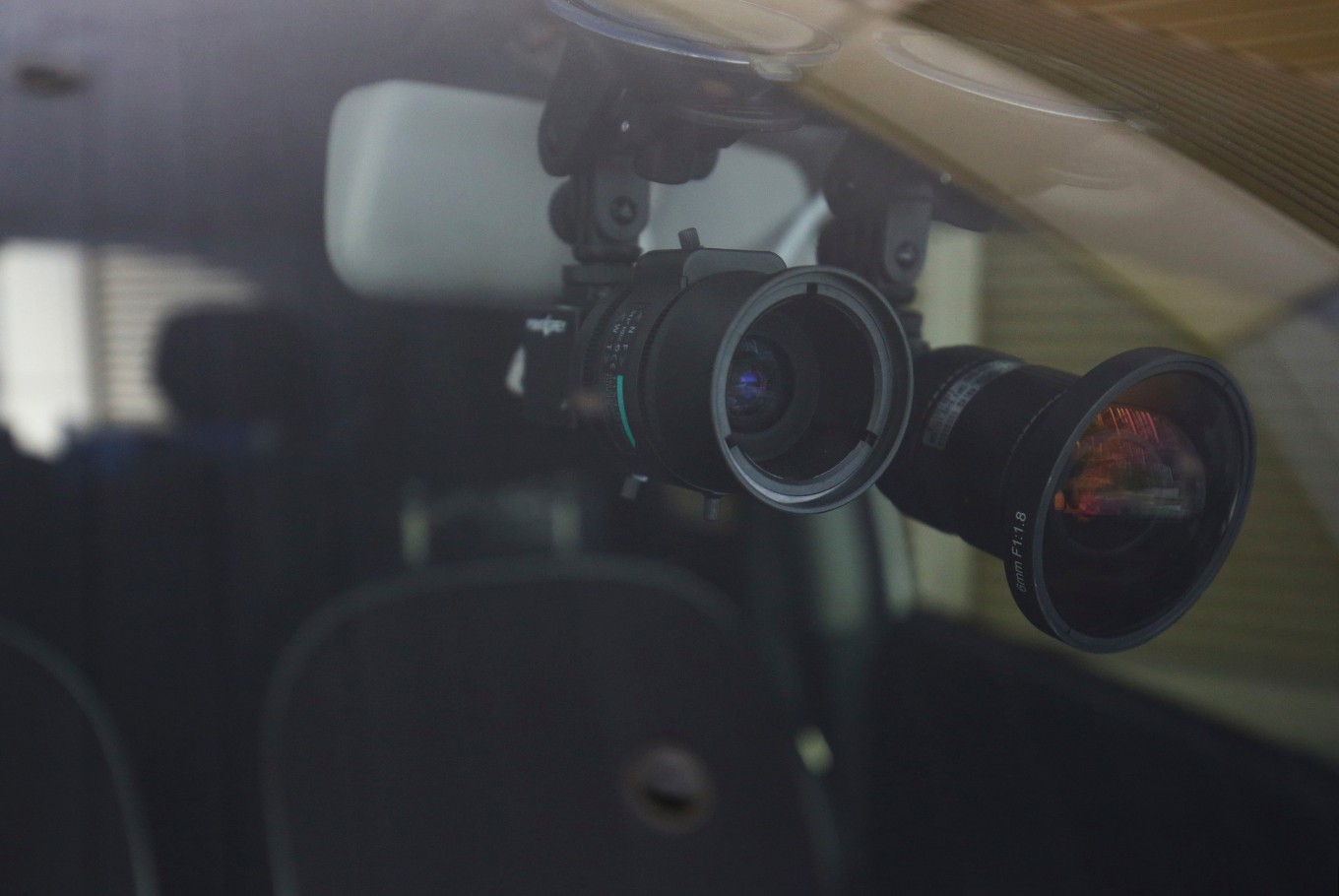Popular Reads
Top Results
Can't find what you're looking for?
View all search resultsPopular Reads
Top Results
Can't find what you're looking for?
View all search resultsWorld's first self-driving taxis debut in Singapore
Change text size
Gift Premium Articles
to Anyone
 An autonomous vehicle is parked for its test drive in Singapore Wednesday, Aug. 24, 2016. The world’s first self-driving taxis, operated by nuTonomy, an autonomous vehicle software startup, will be picking up passengers in Singapore starting Thursday, Aug. 25. The service will start small - six cars now, growing to a dozen by the end of the year. The ultimate goal, say nuTonomy officials, is to have a fully self-driving taxi fleet in Singapore by 2018, which will help sharply cut the number of cars on Singapore’s congested roads. (AP/Yong Teck Lim)
An autonomous vehicle is parked for its test drive in Singapore Wednesday, Aug. 24, 2016. The world’s first self-driving taxis, operated by nuTonomy, an autonomous vehicle software startup, will be picking up passengers in Singapore starting Thursday, Aug. 25. The service will start small - six cars now, growing to a dozen by the end of the year. The ultimate goal, say nuTonomy officials, is to have a fully self-driving taxi fleet in Singapore by 2018, which will help sharply cut the number of cars on Singapore’s congested roads. (AP/Yong Teck Lim)
The world's first self-driving taxis will be picking up passengers in Singapore starting Thursday.
Select members of the public will be able to hail a free ride through their smartphones in taxis operated by nuTonomy, an autonomous vehicle software startup. While multiple companies, including Google and Volvo, have been testing self-driving cars on public roads for several years, nuTonomy says it will be the first to offer rides to the public. It will beat ride-hailing service Uber, which plans to offer rides in autonomous cars in Pittsburgh, by a few weeks.
The service will start small — six cars now, growing to a dozen by the end of the year. The ultimate goal, say nuTonomy officials, is to have a fully self-driving taxi fleet in Singapore by 2018, which will help sharply cut the number of cars on Singapore's congested roads. Eventually, the model could be adopted in cities around the world, nuTonomy says.
For now, the taxis only will run in a 2.5-square-mile business and residential district called "one-north," and pick-ups and drop-offs will be limited to specified locations. And riders must have an invitation from nuTonomy to use the service. The company says dozens have signed up for the launch, and it plans to expand that list to thousands of people within a few months.
The cars — modified Renault Zoe and Mitsubishi i-MiEV electrics — have a driver in front who is prepared to take back the wheel and a researcher in back who watches the car's computers. Each car is fitted with six sets of Lidar — a detection system that uses lasers to operate like radar — including one that constantly spins on the roof. There are also two cameras on the dashboard to scan for obstacles and detect changes in traffic lights.
 A driver, right, gets his hands off of the steering wheel of an autonomous vehicle during its test drive in Singapore Wednesday, Aug. 24, 2016. The world’s first self-driving taxis, operated by nuTonomy, an autonomous vehicle software startup, will be picking up passengers in Singapore starting Thursday, Aug. 25. The service will start small - six cars now, growing to a dozen by the end of the year. The ultimate goal, say nuTonomy officials, is to have a fully self-driving taxi fleet in Singapore by 2018, which will help sharply cut the number of cars on Singapore’s congested roads.(AP/Yong Teck Lim)
A driver, right, gets his hands off of the steering wheel of an autonomous vehicle during its test drive in Singapore Wednesday, Aug. 24, 2016. The world’s first self-driving taxis, operated by nuTonomy, an autonomous vehicle software startup, will be picking up passengers in Singapore starting Thursday, Aug. 25. The service will start small - six cars now, growing to a dozen by the end of the year. The ultimate goal, say nuTonomy officials, is to have a fully self-driving taxi fleet in Singapore by 2018, which will help sharply cut the number of cars on Singapore’s congested roads.(AP/Yong Teck Lim)
The testing time-frame is open-ended, said nuTonomy CEO Karl Iagnemma. Eventually, riders may start paying for the service, and more pick-up and drop-off points will be added. NuTonomy also is working on testing similar taxi services in other Asian cities as well as in the U.S. and Europe, but he wouldn't say when.
"I don't expect there to be a time where we say, 'We've learned enough,'" Iagnemma said.
Doug Parker, nuTonomy's chief operating officer, said autonomous taxis could ultimately reduce the number of cars on Singapore's roads from 900,000 to 300,000.
"When you are able to take that many cars off the road, it creates a lot of possibilities. You can create smaller roads, you can create much smaller car parks," Parker said. "I think it will change how people interact with the city going forward."
NuTonomy, a 50-person company with offices in Massachusetts and Singapore, was formed in 2013 by Iagnemma and Emilio Frazzoli, Massachusetts Institute of Technology researchers who were studying robotics and developing autonomous vehicles for the Defense Department. Earlier this year, the company was the first to win approval from Singapore's government to test self-driving cars in one-north. NuTonomy announced a research partnership with Singapore's Land Transport Authority earlier this month.
(Read also: Self-driving cars go public; Uber offers rides in Pittsburgh)
Singapore is ideal because it has good weather, great infrastructure and drivers who tend to obey traffic rules, Iagnemma says. As a land-locked island, Singapore is looking for non-traditional ways to grow its economy, so it's been supportive of autonomous vehicle research.
Auto supplier Delphi Corp., which is also working on autonomous vehicle software, was recently selected to test autonomous vehicles on the island and plans to start next year.
"We face constraints in land and manpower. We want to take advantage of self-driving technology to overcome such constraints, and in particular to introduce new mobility concepts which could bring about transformational improvements to public transport in Singapore," said Pang Kin Keong, Singapore's Permanent Secretary for Transport and the chairman of its committee on autonomous driving.
 Cameras that help detect changes in traffic light colors are seen inside an autonomous vehicle during its test drive in Singapore Wednesday, Aug. 24, 2016. The world’s first self-driving taxis, operated by nuTonomy, an autonomous vehicle software startup, will be picking up passengers in Singapore starting Thursday, Aug. 25. The service will start small - six cars now, growing to a dozen by the end of the year. The ultimate goal, say nuTonomy officials, is to have a fully self-driving taxi fleet in Singapore by 2018, which will help sharply cut the number of cars on Singapore’s congested roads.(AP/Yong Teck Lim)
Cameras that help detect changes in traffic light colors are seen inside an autonomous vehicle during its test drive in Singapore Wednesday, Aug. 24, 2016. The world’s first self-driving taxis, operated by nuTonomy, an autonomous vehicle software startup, will be picking up passengers in Singapore starting Thursday, Aug. 25. The service will start small - six cars now, growing to a dozen by the end of the year. The ultimate goal, say nuTonomy officials, is to have a fully self-driving taxi fleet in Singapore by 2018, which will help sharply cut the number of cars on Singapore’s congested roads.(AP/Yong Teck Lim)
Olivia Seow, 25, who does work in startup partnerships in one-north and is one of the riders nuTonomy selected, took a test ride of just less than a mile on Monday. She acknowledged she was nervous when she got into the car, and then surprised as she watched the steering wheel turn by itself.
"It felt like there was a ghost or something," she said.
But she quickly grew more comfortable. The ride was smooth and controlled, she said, and she was relieved to see that the car recognized even small obstacles like birds and motorcycles parked in the distance.
"I couldn't see them with my human eye, but the car could, so I knew that I could trust the car," she said. She said she is excited because the technology could free up her time during commutes or help her father by driving him around as he grows older.
An Associated Press reporter taking a ride Wednesday observed that the safety driver had to step on the brakes once, when a car was obstructing the test car's lane and another vehicle, which appeared to be parked, suddenly began moving in the oncoming lane.
Iagnemma said the company is confident that its software can make good decisions. The company hopes its leadership in autonomous driving will eventually lead to partnerships with automakers, tech companies, logistics companies and others.
"What we're finding is the number of interested parties is really overwhelming," he said.










